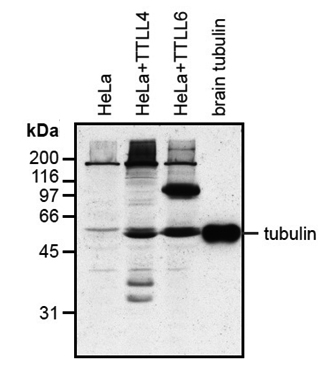
Western blot analysis of protein glutamylation with MAb to polyglutamylation modification (GT335) (Prod. No. AG-20B-0020). Method: HeLa cells grown in standard culture conditions are lysed in SDS sample buffer and run on 10% SDS-PAGE. The pro
anti-Polyglutamylation Modification, mAb (GT335)
AG-20B-0020
ApplicationsElectron Microscopy, ImmunoPrecipitation, Western Blot, ImmunoCytoChemistry, ImmunoHistoChemistry
Product group Antibodies
ReactivityAll Species
Overview
- SupplierAdipoGen Life Sciences
- Product Nameanti-Polyglutamylation Modification, mAb (GT335)
- Delivery Days Customer10
- ApplicationsElectron Microscopy, ImmunoPrecipitation, Western Blot, ImmunoCytoChemistry, ImmunoHistoChemistry
- CertificationResearch Use Only
- ClonalityMonoclonal
- Clone IDGT335
- Concentration1 mg/ml
- Estimated Purity>95%
- HostMouse
- IsotypeIgG1
- Scientific DescriptionMonoclonal Antibody. Recognizes the posttranslational modification (poly)glutamylation on proteins. Reacts with polyglutamylated alpha- and beta-tubulin. Isotype: Mouse IgG1kappa. Clone: GT335. Applications: EM, ICC, IHC, IP, WB. Liquid. In PBS containing 10% glycerol and 0.02% sodium azide. Polyglutamylation is a post-translational modification in which glutamate side chains of variable lengths are formed on the modified protein. It is evolutionarily conserved and the most prominent substrate is tubulin, the microtubule (MT) building block. Polyglutamylation has been proposed to be involved in the functional adaptation of MTs, as it occurs within the carboxy-terminal tubulin tails that participate directly in the binding of many structural and motor MT-associated proteins. The recent identification of new substrates of polyglutamylation indicates that this post-translational modification could be a potential regulator of diverse cellular processes and be involved in cell cycle and cell proliferation. - Polyglutamylation is a post-translational modification in which glutamate side chains of variable lengths are formed on the modified protein. It is evolutionarily conserved and the most prominent substrate is tubulin, the microtubule (MT) building block. Polyglutamylation has been proposed to be involved in the functional adaptation of MTs, as it occurs within the carboxy-terminal tubulin tails that participate directly in the binding of many structural and motor MT-associated proteins. The recent identification of new substrates of polyglutamylation indicates that this post-translational modification could be a potential regulator of diverse cellular processes and be involved in cell cycle and cell proliferation.
- ReactivityAll Species
- Storage Instruction-20°C,2°C to 8°C
- UNSPSC41116161
